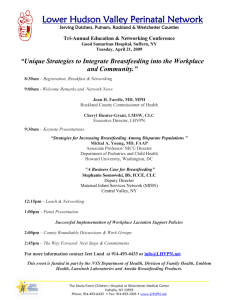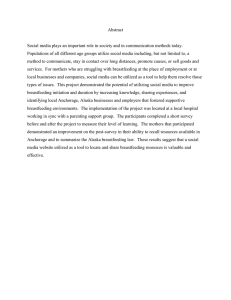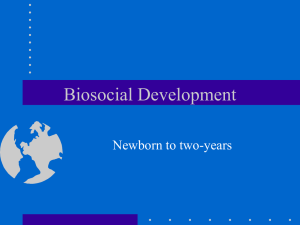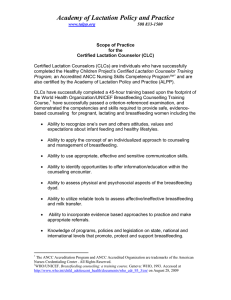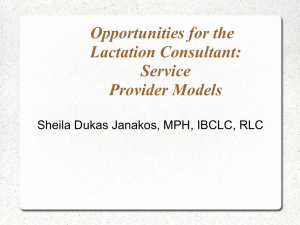Certified Lactation Counselor ( CLC )
advertisement
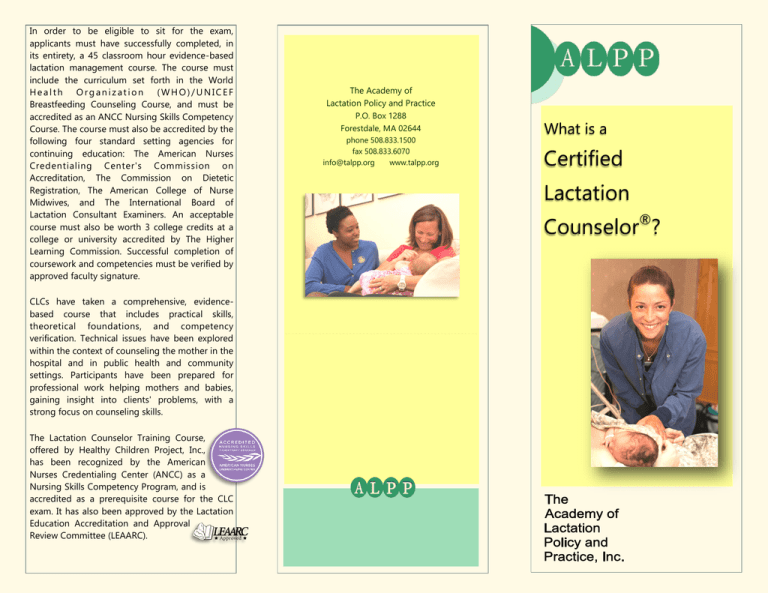
In order to be eligible to sit for the exam, applicants must have successfully completed, in its entirety, a 45 classroom hour evidence-based lactation management course. The course must include the curriculum set forth in the World Health Organization (WHO)/UNICEF Breastfeeding Counseling Course, and must be accredited as an ANCC Nursing Skills Competency Course. The course must also be accredited by the following four standard setting agencies for continuing education: The American Nurses Credentialing Center's Commission on Accreditation, The Commission on Dietetic Registration, The American College of Nurse Midwives, and The International Board of Lactation Consultant Examiners. An acceptable course must also be worth 3 college credits at a college or university accredited by The Higher Learning Commission. Successful completion of coursework and competencies must be verified by approved faculty signature. CLCs have taken a comprehensive, evidencebased course that includes practical skills, theoretical foundations, and competency verification. Technical issues have been explored within the context of counseling the mother in the hospital and in public health and community settings. Participants have been prepared for professional work helping mothers and babies, gaining insight into clients' problems, with a strong focus on counseling skills. The Lactation Counselor Training Course, offered by Healthy Children Project, Inc., has been recognized by the American Nurses Credentialing Center (ANCC) as a Nursing Skills Competency Program, and is accredited as a prerequisite course for the CLC exam. It has also been approved by the Lactation Education Accreditation and Approval Review Committee (LEAARC). The Academy of Lactation Policy and Practice P.O. Box 1288 Forestdale, MA 02644 phone 508.833.1500 fax 508.833.6070 info@talpp.org www.talpp.org What is a Certified Lactation Counselor®? The Certified Lactation Counselor® (CLC) designation from The Academy of Lactation Policy and Practice, Inc. is the premier national certification in lactation management in the United States. CLC certificants are required to pass core competencies and skill verifications as well as a psychometrically designed exam based on a job task analysis. A credentialed CLC has demonstrated the knowledge and skill to: assess breastfeeding using a multi-faceted approach. use counseling skills and techniques that are supportive to breastfeeding mothers and babies. construct and maintain conditions that predispose mothers and babies to an uncomplicated breastfeeding experience through counseling, education, and support. assess for, monitor, and evaluate physical conditions that predispose mothers and babies to a complex breastfeeding experience. educate, counsel, and support families with complex breastfeeding situations. monitor and evaluate behavioral, cultural, and social conditions that predispose mothers and babies to complex breastfeeding conditions. identify and advocate for aspects of breastfeeding management programs that facilitate optimal health outcomes. identify and advocate for public health strategies that serve to protect breastfeeding. coordinate care consistent with standards of professional ethics and behavior. Part of the team CLCs are members of the healthcare team who can provide knowledge and counseling about optimal and suboptimal breastfeeding. The CLC works to solve problems in conjunction with other professionals and strives to provide appropriate referrals and recommendations. The CLC has demonstrated competence and passed a psychometrically-designed exam based on job a task analysis. The CLC is nationally certified and works in many settings, including: Family-focused CLCs understand that breastfeeding decisions are made by the mother, who may have values and goals different from the counselor. A counseling approach is used to elicit information and provide appropriate support to the mother and her family. maternity units in hospitals, birth centers, and clinics neonatal intensive care units and special care nurseries outpatient lactation clinics WIC programs visiting nurse programs physician and midwife offices maternal and child health services parenting centers and family support centers pediatric and prenatal care providers private practice In the community The CLC works to increase breastfeeding rates, advocates for societal change in attitudes and behavior regarding breastfeeding, teaches breastfeeding classes, and assists mothers in successfully breastfeeding exclusively and for longer durations. The CLC certification is accredited by the American National Standards Institute (ANSI) which certifies that the Academy of Lactation Policy and Practice meets the ANSI accreditation program requirements and those set forth in ANSI/ISOIEC 17024:2012 general requirements for bodies operating certification systems of persons.
